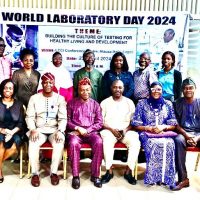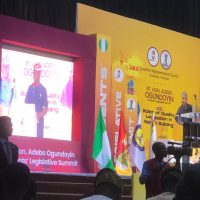
A discussion of the nationalism question in Nigeria has always revolve around the triumvirate of Obafemi Awolowo, Nnamdi Azikiwe and Ahmadu Bello in no particular order, but having an in-depth study into the life and times of these men, their aspirations, their politicking and conduct, were they really nationalists in the real sense of the word or mere accidental nationalists who wounded up to one another at independence, but fought dirty before and after for the prominence of their own aspirations and the lording of their own ethnic stock over the others?
The oldest of the triumvirate is Nnamdi Azikiwe who started off as a hothead journalist with African Morning Posts in Ghana before later founding his own West African Pilot in 1937. Nnamdi Azikiwe’s first entry into national politics was his involvement with the Nigeria Youth Movement, the country’s first nationalist organization which he left in acrimonious circumstance in 1941 when his anointed candidate Samuel Akinsanya was not elected for a vacant seat in the Legislative Council, the NYM executive council selected Ernest Ikoli who ironically was supported by Obafemi Awolowo ( this was the first political meeting between Azikiwe and Awolowo, which was the beginning of an intense rivalry within the political space of Nigeria between the duo which would last nearly half century). Nnamdi Azikiwe withdrew from the NYM, condemning the party of tribalism against the Ijebu-Yorubas and Igbos.

Obafemi Awolowo on the other and rose to national consciousness in 1941, having joined the Nigeria Youth Movement earlier and supported the election of Ernest Ikoli into the Legislative Council in Lagos before proceeding to London to study Law and was eventually called into the English bar in 1944.
As a great grandson of Mohamed Bello, the son of the great Islamic scholar and jihadist of the 19th century, Uthman Dan Fodio, and having a sultan grandfather, Ahmadu Bello was different from Awolowo and Azikiwe as he was a blue blooded royalty. At the age of 28, Bello contested to become the Sultan of Sokoto but lost to Siddiq Abubakar III who reigned for 50 years until 1988, thus becoming the Sarduana (Crown prince) of sokoto and steadily rose through the traditional ranking.
Ahmadu Bello rose to national consciousness with the formation of the Northern People’s Congress in 1949 from the Northern socio-cultural group Jammaya Islamiyya Arewa and he subsequently became its leader with his work in the 1950 All Ibadan constitutional conference as head of the Northern delegates.
Obafemi Awolowo, while studying in London has founded ‘Egbe omo oduduwa’, a student body of people of Yoruba descent, a group which was launched in Owo, the present Ondo state as the Action Group party to serve as the counter balance to the earlier formed National Council of Nigeria and Cameroun (NCNC, which was later changed to National Council of Nigerian Citizens) which was formed earlier by Nnamdi Azikiwe and Herbert Macaulay which the former was now leading and was gaining much traction in the western Nigeria ahead of the 1951 regional election.
It is worthy of note that the1951 election was the first toe-to-toe political battle waged by Awolowo and Azikiwe, with the former castigating the latter as a nationalist who would prefer to be premier in Ibadan than in Enugu. With the inability of Azikiwe to be elected into the House of Representatives via the western region in 1951causing much disaffection between Awolowo and Azikiwe, the latter returned to the eastern region to become the premier in 1954, thus, the stage was set for an ethnic dominated politics in the first republic and beyond.
The approach of the three men to the administration of the emerging heterogeneous structure called Nigeria is noteworthy, Obafemi Awolowo in his book ‘Path to Nigerian Freedom’ (1947) had advocated for the adoption of Federalism, with component units formed along ethnic lines. Azikiwe on the other hand, through his belief in the corporate existence of the country advocated Unitarianism while Ahmadu Bello advocated Confederalism. How the latter leaders could have advocated Unitarianism and confederalism respectively for a heterogeneous Nigeria is rather a bewilderment to say the least.
Close to Nigeria’s first republic, a huge seed of discord was sown among the three men when Tony Enahoro moved a motion for independence in 1956, fearing domination, Ahmadu Bello rejected the motion, replacing 1956 with the now unpopular phrase ‘as soon as practiceable’.
The 1959 parliamentary election which was to usher Nigeria into the first republic was ethnically dominated, with the NPC and affiliates winning 134 of the 312, the NCNC and affiliates winning 89 and the AG and affiliates winning 72 seats, thus, the stage was a set for a coalition government between any of the three parties. Despite sharing the same progressive ideology and with a promise to step down from the position of Prime minister to minister of finance by Awolowo in his favour, Azikiwe led the NCNC to form an alliance with the conservative NPC in other to spite Awolowo for his 1951 daringness, in effect, Azikiwe ignored the offer of premiership to become a titular head of state under the NPC arrangement. It is now only left to imagination how an alliance of NCNC and AG with Azikiwe as prime minister and Awolowo as Finance minister would have set Nigeria on the path of prosperity in the First republic.
How much of a nationalist the duo of Bello and Azikiwe is left to posterity with the summary trial of Awolowo on trumped up treason charges as a result of the western region crisis of 1965/66 and the carving out of the mid-western region out of the western region in 1966 in a permanent attempt at limiting the influence of Awolowo and setting Nigeria up for its current state of lopsided federalism of which the very stock of Azikiwe are a victim.
The coup d’etat of January 1966 which claimed the life of Ahmadu Bello at the age of 56, according to repeated prophesies of Northern imams and diviners, cut his life short at his prime and denied him of his lifelong ambition of one day occupying the Sultanate in Sokoto but was still very enough to carve a place for him in the annals of Nigeria history as a champion of the north and an exporter of the domination at all cost mentality of his lineage, which has now gained much traction among northern elite and aristocrats.
The demise of the first republic did not however put paid to the growing profile and rivalry between Awolowo and Azikiwe which was soon put to test in the second republic with the formation of ‘national political parties’ which were at best a caricature of the first republic NCNC and AG. The Nigeria Peoples Party was formed and registered by the associates of the Owelle of Onitsha, the Unity Party of Nigeria by associates of the Odole Odua and the National Party of Nigeria by the remnant of the defunct NPC led by the docile Shehu Shagari, the other two political parties; GNPP led by Ibrahim Waziri was a result of in fighting in the NPP and PRP was re-incarnation of the first republic NEPU under the charismatic Mallam Aminu Kano.
Awolowo’s undoing in the second republic was a result of his inability to reach out to the other side of the south, especially to the eastern region where his controversial role in the Nigerian civil war was now his albatross, cheered on by a new messiah in Chukwuemeka Ojukwu, and still with the respected Owelle to contend with, Awolowo would register no meaningful electoral presence in eastern Nigeria.
Also contributing to Awolowo’s woes is the fact that his first republic lieutenant; Tony Enahoro and J.S Tarka would hitherto held strategically important minority base of Edo and Benue for him were now in the folds of the NPN.
The enigmatic Owelle of Onitsha would make no meaningful impact outside of the Igbo heartland, especially in the north, no thanks to his role in the 1962/63 census crisis, and his reputation as an unstable ally. Aided by Ojukwu, some of his own even resented him because of his role in the civil war where he chameleon seamlessly between a Biafran ambassador when it pays and a pro-Nigerian when the weather looked different.
The 1983 election which was the last that was participated in by the duo of Azikiwe and Awolowo cemented their place in our national political history, just like in 1959, having lost in the election proper, Azikiwe danced gleefully to the invitation of Shehu Shagari’s government of national unity in 1979, on realising that the cream de la cream of his NPP membership handpicked by Shagari were being harvested into the ruling NPN, he pulled out of the political arrangement. With the abysmal performance of Shagari in office, it was clear that Nigerians wanted a change, after much dilly-dally and dragging feet, and at the very last minute the Owelle decided to throw his hat into the ring, running famously as the ‘beauty pride’ who had no real chance at the polls, much to the chagrin of Awolowo.
In fairness to the trio of Awolowo, Bello and Azikiwe, the politics of the pre and first republic with its regional and ethnic nature did not allow the men the ample ground to sow and harvest seed of nationalism, as primordial and ethnic sentiment must be spinned among the common men to gain their cult following, but all leaders have shown through their actions; Azikiwe through his preference for Unitarianism for an heterogeneous entity like Nigeria based on his belief of indivisible common destiny of the Nigerian people, but which was actually a veiled attempt at Igbo domination, which people in some quarters felt was acted on by the January, 1966 coup plotters, his subsequent prioritization of revenge over national interest in 1959 by the choosing the much conservative NPC over a much workable alliance with AG and lastly his macabre dance in the 1983 election where he should have retired as a statesman.
Ahmadu Bello’s propensity towards sectional interest over national interest was first shown in his opting for confederalism for an heterogeneous structure like Nigeria, an obvious indication of unbelief in the Nigerian state, his issuance of the 8 points agenda which demanded for a confederation after the motion for government fiasco in Lagos in 1953, his refusal to hire qualified Nigerians into northern civil service and the hiring of British expatriate in their stead, fearing domination are sure indices of anti-nationalism.
Awolowo of the trio appeared to have a genuine belief in the Nigerian state when he, as early as 1947 suggested the adoption of federalism as a system of government for the Nigerian state, but Awolowo cannot be spared of his hatred, especially towards the northern elite, who he derisively described as feudal lords even on the campaign train, his prioritization of the Yoruba stock over the rest of his countrymen runs contrary to the spirit and meaning of true nationalist.
It is therefore evident from the life, politics and choices of these men that the appellation ‘Nigerian nationalist’ attached to them is nothing but vain glorification as some other men who were detribalized in their dealings, fought for the right of Nigerians notwithstanding their linguistic affinity such as Herbert Macaulay are more deserving of being ascribed Nationalist.


